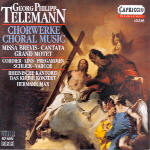Several splendid Telemann vocal and choral compositions grace this thoroughly enjoyable CD, waiting to be discovered by the adventurous listener. The Missa brevis, for alto, two violins, and basso continuo, is an early work; its Kyrie is rooted in early Baroque styles, but its Gloria is forward-looking and unique. Countertenor David Cordier sings this piece with sensitivity and intimate expression. The Grand Motet, “Deus judicium tuum”, is from Telemann’s heyday in Hamburg, written at a time when the composer had journeyed to France. Its dotted-note opening chorus, sounding for all the world like a choral French overture, indicates his desire to score points as an expert in the country’s style. The last work on the program by itself is worth the disc’s mid-price. Referred to in the notes as Telemann’s “Spring Cantata”, it might also be referred to as the “ornithologist’s delight”, since it is crammed with references to various birds who offer praise to God. Although it seems that nearly every prominent European bird is mentioned–including the starling, which was imported to the United States when Europeans became homesick for it–it’s the soprano recitative and aria devoted to the nightingale that is most memorable. Barbara Schlick has a field day with this florid, intricate music, producing lyrical, virtuoso singing of the highest order. The small chamber orchestra produces wonderful sounds throughout all three works, and the chamber chorus handles its assignment in the Motet with good tone, intonation, and precision. Guiding all is Hermann Max, who has exactly the right feeling for Telemann’s glorious music, pacing it properly and letting its wonders unfold as written. The recorded sound is clean, though slightly muffled, but not to a detrimental degree.
































